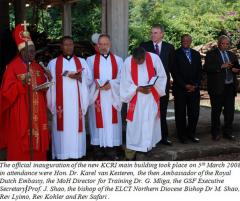History

KCRI forms the third pillar of Good Samaritan Foundation (GSF). The GSF is a locally registered non-governmental non-profit organization of the Evangelical Lutheran Church (ELCT) of Tanzania with Memorandum of Understating with the Government of Tanzania through the Ministry of health and Social Welfare (MoHSW). Its Board of Trustees (BoT) includes representatives from the ELCT, Anglican Church, and Moravian Church. The presiding bishop of ELCT is the chairperson. The members meet four times annually to deliberate on policy issues. The presiding Bishop of ELCT also is the Chair of theBoard of Governors (BoG) of GSF. The BoG consists of nine members of whom two members are from the MoHSW (Permanent Secretary, and Director of Training); one member is from the Ministry of Finance (Permanent Secretary) and the Regional Administrative Secretary of Kilimanjaro region. The remaining five members are representatives of the church. The committee meets four times annually to receive and review performance reports, and guide KCMC management and approval its activities.
THE THREE PILLARS OF THE GSF
The vision of GSF was from its inception to have a centre providing for health services and training and conducting research; the three pillars. The Good Samaritan Foundation through its commitment and determination has been enabled by the grace of the almighty God to establish the third pillar of the centre; namely the Kilimanjaro Clinical Research Institute (KCRI). Health services started with the inauguration of the hospital in 1971 and have been expanding ever since. Today there are modern facilities, medical specialties and subspecialties that are rare in the region. Alongside the expansion of health services, training activities were started from certificate to diploma levels. This combination developed into a unique practice of harmonising patients’ care and training of health personnel without jeopardizing patients’ health and well-being. This experience contributed to the decision to open a University Medical college (KCM College of Tumaini University). Simultaneously with the expansion of health services and health-related training, research activities expanded from KAP studies and basic studies to high technology and clinical research. The Foundation thus found that this was the ideal time to establish the infrastructure (physical and personnel) for research; this led to the establishment of the Kilimanjaro Clinical Research Institute (KCRI). KCRI coordinates all research activities at KCMC. The unique research environment at KCMC has enabled KCRI to serve as an academic centre for evidence based health interventions.
Background
Establishing a medical research institute as one of the three pillars of KCMC was identified in the early 1970s. However, the lack of infrastructure and the need for capacity development for research personnel led to the delay in establishing the institute. To address these two areas whilst still undertaking research activity, KCMC developed important collaborations with various Northern partners including Radboud University, Duke University, Harvard University, University of Virginia, London School of Hygiene and Tropical Medicine, Bergen University etc.
The collaboration between KCMC and Radboud University in The Netherlands through the APRIORI Program was significant in establishing a facility to support the coordination of medical research at KCMC. In 2006 Kilimanjaro Clinical Research Center (KCRC) was established, support from Dutch government through NACCAP and later from EDCTP through VITA study and EACCR provided resources which were used for physical infrastructure and capacity development for staff and in March, 2009 the Kilimanjaro Clinical Research Institute (KCRI) was established.
The chronology leading to the establishment of KCRI can be summarized as follows:
- 1971 - KCMC was established by the Good Samaritan Foundation (GSF) to provide for health services, training and research.
- 1978 - Parasitological Research Laboratory Unit was established at KCMC by the Ministry of Health (MoH).
- 1985 - The laboratory was upgraded by MoH to a Northern Zone Reference Centre for Parasitic and Infectious Diseases (NZRCPID).
- 1991 - NZRCPID was upgraded to KCMC-Medical Research Centre (KCMC-MRC).
- 2002 - Establishment of various research programs and centres at KCMC, notably Joint malaria Program 2002, JMP(KCMC,NIMR,LSHTM,CMP), Duke University-KCMC Research program (2001), KCMC-Virginia University collaborative research, Kilimanjaro Reproductive Health Program (KRHP) through Harvard School of Public Health (2002), KCMC Reproductive Health Centre (2002)-WHO and Bergen University collaboration, Kilimanjaro Centre for Community Ophthalmology, KCCO (2004), PRIOR: Collaboration of KCMC and Dutch Universities (2004), 2006-Kilimanjaro Clinical Research Centre,KCRC;KCMC-RUNMC collaboration (APRIORI Program).
- 2009 - (5 March) Establishment of the Kilimanjaro Clinical Research Institute as an institution of the Good Samaritan Foundation.